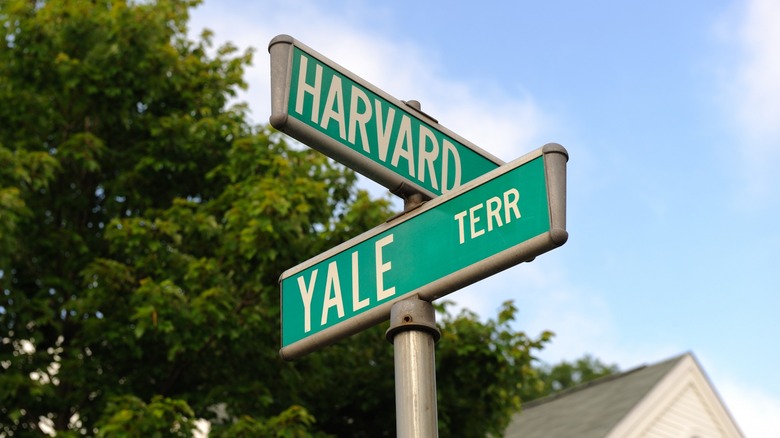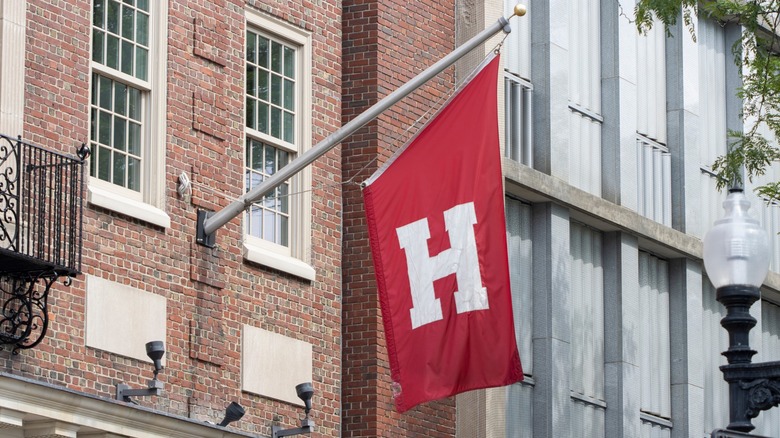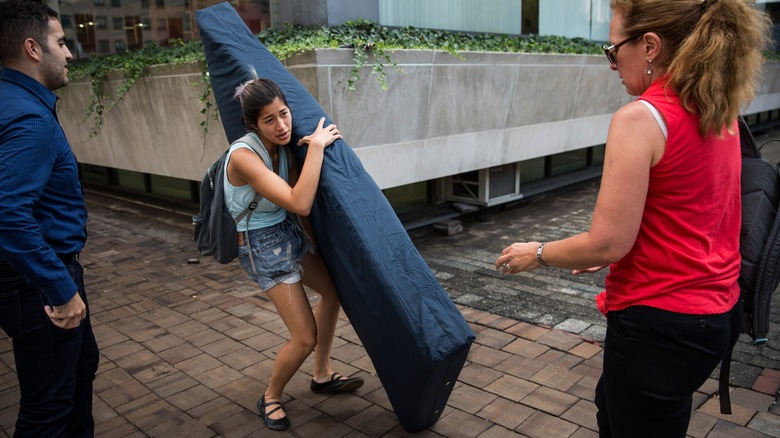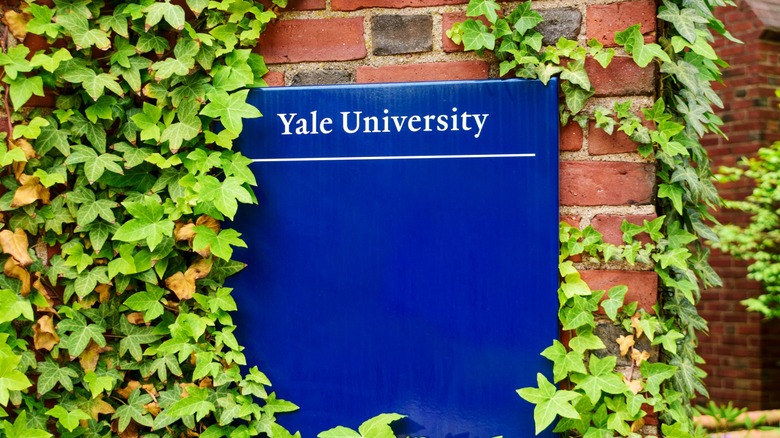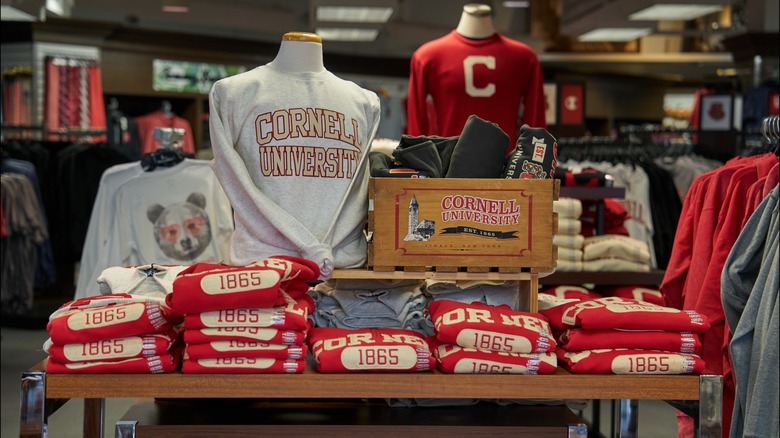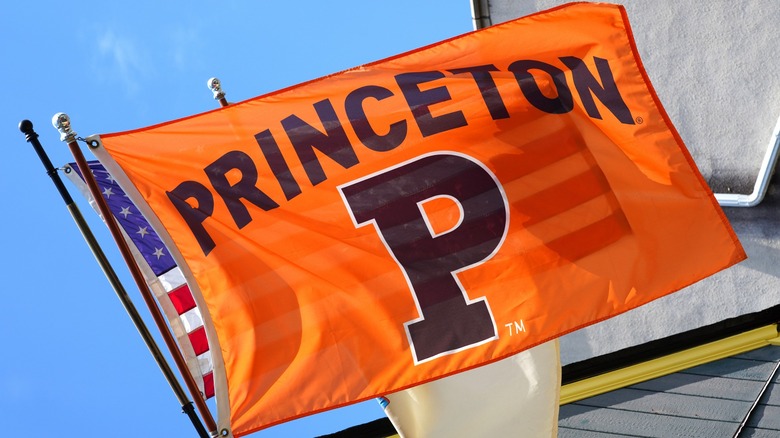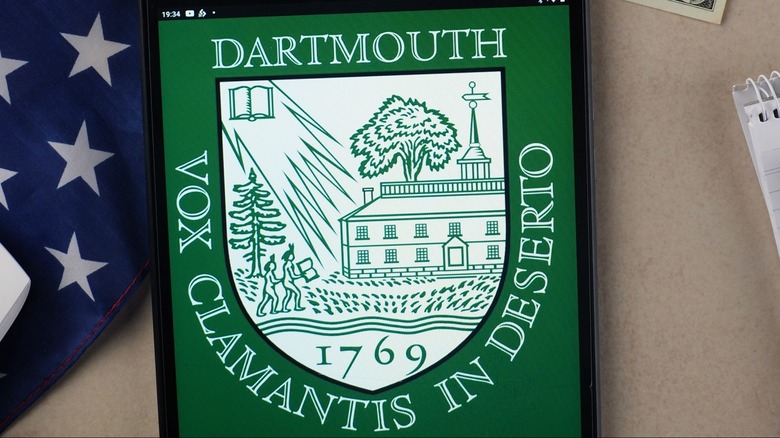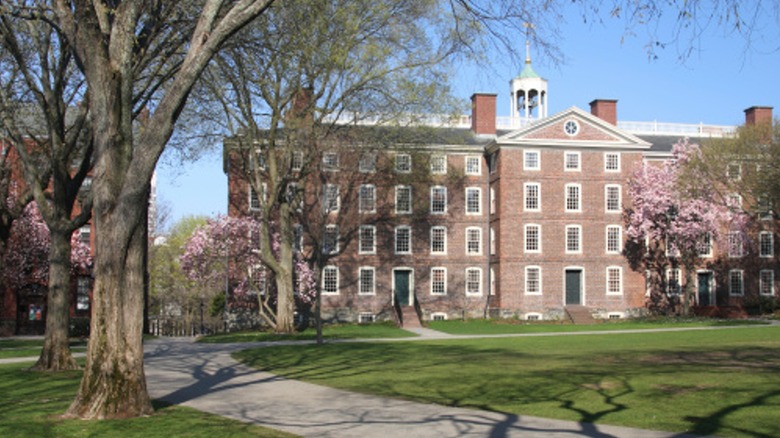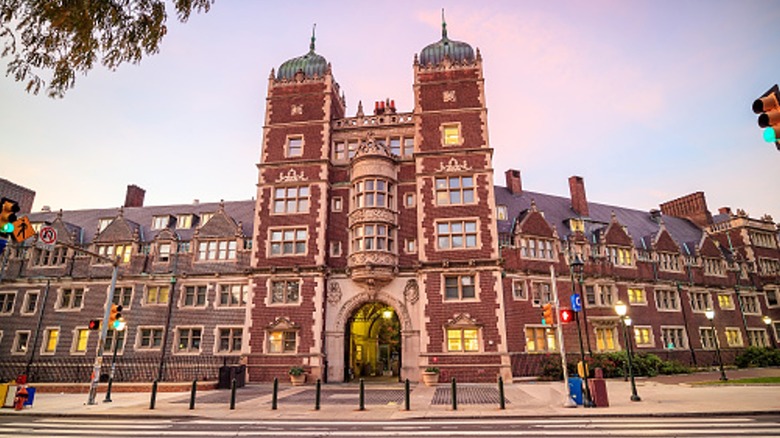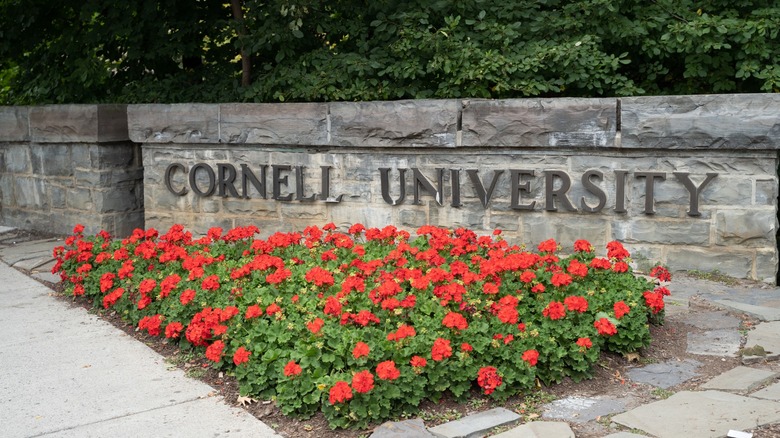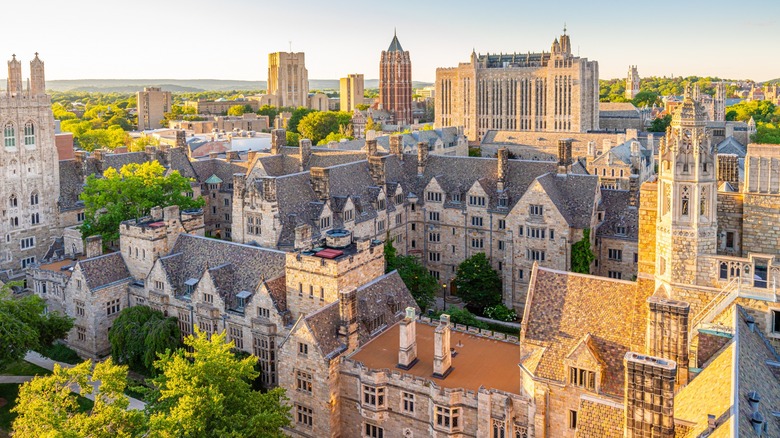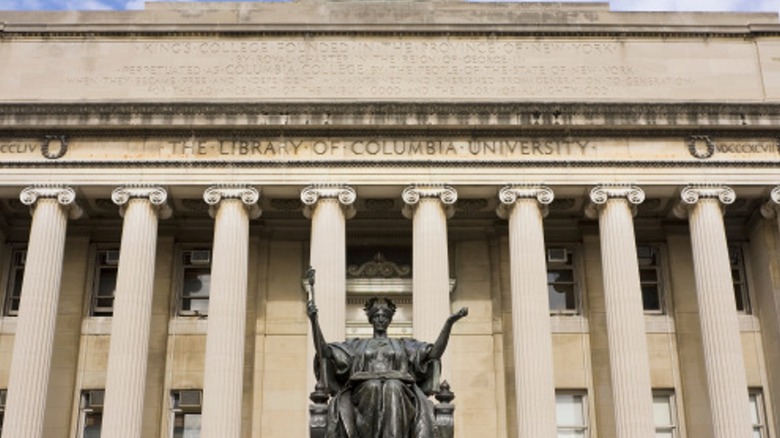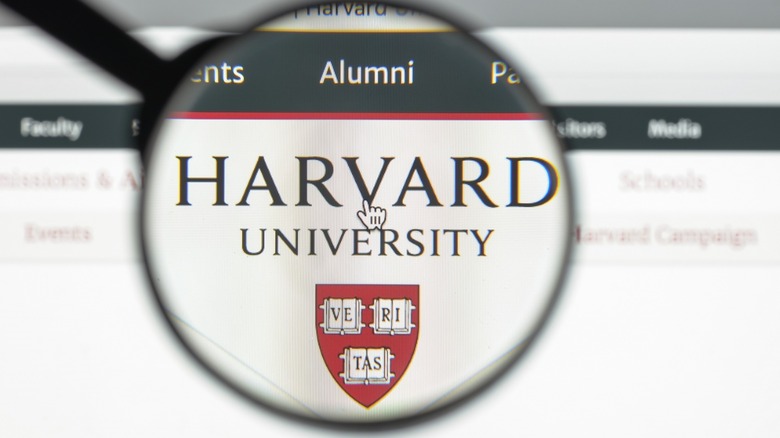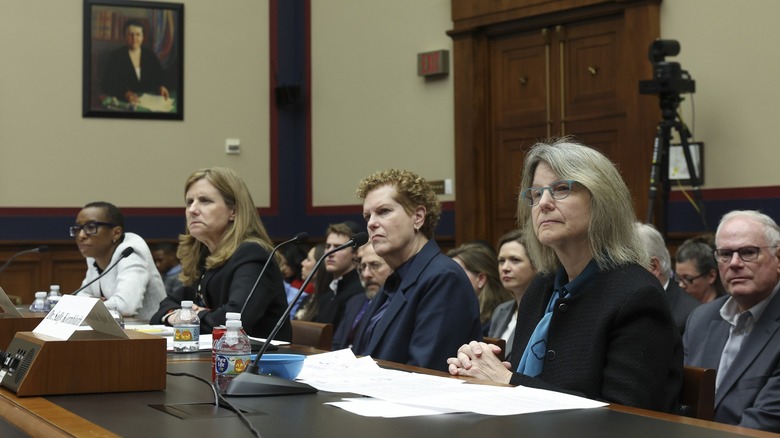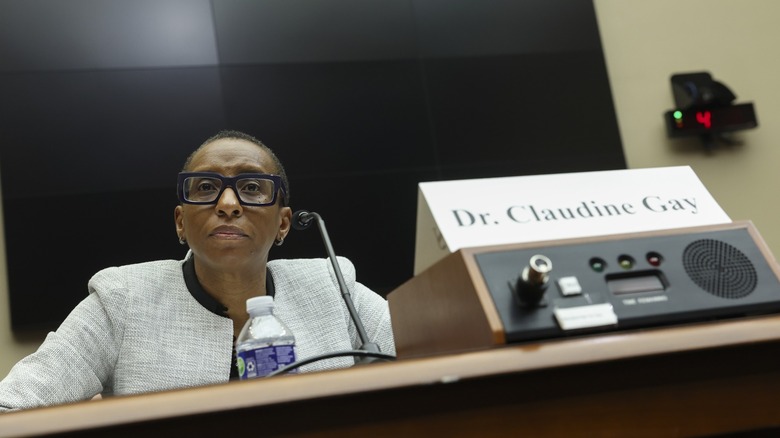14 Of The Biggest Scandals To Hit Ivy League Schools
Usually, when we think about the Ivy League, it's closely associated with the highest degree of prestige. Some of the best institutions in the entire world reside within the Ivy League, and they have well-deserved reputations for excellence that, in most cases, have been forged over centuries. The Ivy League consists of eight different universities from the American Northeast: Brown, Columbia, Cornell, Dartmouth, Harvard, Pennsylvania, Princeton, and Yale.
Many people think that "Ivy League" has an academic meaning, but it actually refers to the athletic conference the schools collectively belong to. The Ivy League conference officially formed in 1954, and they are one of the oldest still going in collegiate athletics today.
Yet, despite their incredible success, esteem, and distinction, the universities of the Ivy League have been far from scandal-free. While the scandals have not been enough to permanently damage their academic and social reputations for the most part, there have been some deeply disturbing incidents, ranging from sexual assault and brutal hazing to the black-market distribution of body parts harvested from donated cadavers. It really makes you think about the prominence of such supposedly dignified universities, and how such horrific episodes could have happened under their watch.
The 2023 Harvard Morgue scandal
Over the summer of 2023, it came to light that the longtime manager of Harvard Medical School's mortuary, Cedric Lodge, was allegedly taking body parts from cadavers and selling them on the black market. He did so over a period of five years from 2018–2022, as part of an illicit ring that spanned several states ranging from New Hampshire to Arkansas.
Lodge and his wife were just two of the seven people indicted by federal prosecutors, and the university immediately terminated him when the allegations surfaced. The couple allegedly sold pieces of cadavers that had been donated and already been dissected, and they even let some of the buyers pick out the items in person at Harvard. The items included some pretty creepy offerings, like human skin and bones, and even faces and brains. In addition to the morgue at Harvard, there was also one in Little Rock that allegedly sold stolen remains as part of the illegal network. Shockingly, it's alleged that the worker at the Little Rock mortuary may have even sold the remains of stillborn babies.
Lodge allegedly made tens of thousands of dollars selling the stolen remains, but now faces several federal charges along with his wife. The worker at the Little Rock mortuary, Candace Chapman Scott, also faces charges, and has pleaded not guilty.
Emma Sulkowicz's mattress protest at Columbia
From 2013–2017, the Emma Sulkowicz sexual assault scandal was constantly in the headlines, tarnishing Columbia's name every step of the way. The problems started in April 2013, when Sulkowicz, a Columbia student, reported being raped by a classmate, Paul Nungesser, the year prior. Though Nungesser was cleared by the school, the case made national headlines when Sulkowicz and two others shared their experiences with sexual assault or harassment involving Nungesser with the New York Post in December 2013.
The temperature rose even further when Sulkowicz began her "Carry That Weight" protest the following fall. The protest, which also doubled as a performance art piece for her senior thesis, involved her carrying around a 50-pound mattress all over campus. The mattress represented the university's lack of punishment for those who had committed sexual assault. Sulkowicz carried it for nearly a year until she graduated in 2015, though she said she would have stopped if the university had taken action against Nungesser, which they never did.
On the other side, Nungesser filed a lawsuit against Columbia for defamation over the incident, which he later settled in undisclosed terms in 2017. It was one of the ugliest scandals in recent memory, and still looms large for many when thinking about the Ivy League.
The Varsity Blues scandal
The infamous Varsity Blues admissions scandal was probably the biggest scandal to rock the world of higher education in the last decade, and it turns out even the prestigious Ivy League universities of Yale and Harvard were wrapped up in it. The scandal involved wealthy parents — including celebrities such as Lori Loughlin and Felicity Huffman — essentially buying their kids' way into top colleges with bribery and fake athletic credentials.
Members of the athletic departments for both Yale and Harvard found themselves in pretty hot water when the scandal erupted. From Harvard, authorities alleged that former fencing coach Peter Brand helped secure the admission of a student to the school after accepting $1.5 million in bribes from the student's father. The bribes included a car, paying off Brand's mortgage, and paying college tuition for Brand's son. From Yale, the former women's soccer coach, Rudolph "Rudy" Meredith, was charged with multiple counts of wire fraud after it was alleged he accepted $860,000 in bribes to get several kids admitted to the school.
While Brand was acquitted by a jury in 2022, Meredith pleaded guilty and received a five-month prison sentence. The schools themselves were not officially implicated in the scandal, but the allegations against Brand along with Meredith's guilty plea and prison sentence made them look pretty bad, and Yale is still widely associated with the scandal.
Cornell's fraternity scandal
During Cornell University's Fall 2022 semester, a scandal broke out after it emerged there were repeated incidents of sexual assault and druggings at off-campus fraternity parties. It started in early November, when campus police issued a crime alert after responding to four separate reports of students being drugged and at least one case of a student being sexually assaulted.
Cornell issued a statement condemning the episodes and vowing to hold those who committed the crimes responsible. Administrators then took things even further by prohibiting all fraternities from holding parties and social events for the entire semester. While the action was commendable, the high volume of incidents in such a close proximity drew much unwanted attention to the school's questionable off-campus and fraternity culture. In addition, after Cornell issued its statement, even more reports alleging sexual assault and druggings involving fraternities emerged.
Regrettably for Cornell, this was not the school's first time having problems related to sexual assault. In both 2018 and 2020 they came under fire for having large numbers of sexual assault cases, with a 2019 survey indicating that half the student body had dealt with harassment during their time on campus. In February 2023, Cornell rescinded the ban, once again allowing fraternities to hold parties.
The Joshua Katz-Princeton saga
In May 2022, Princeton tried to resolve a prominent scandal when it fired longtime professor Joshua Katz. The Katz scandal had begun in 2018, when Princeton suspended him after an investigation determined that he had had sex with one of his undergraduate students years earlier. Katz had been teaching at Princeton since 1998 and gained tenure as an associate professor in 2006 — a status he was able to keep even after his 2018 suspension.
In 2020, Katz drew national attention after writing an article titled "A Declaration of Independence by a Princeton Professor," which was critical of some of the school's diversity, equity, and inclusion initiatives. However, the following year in 2021, Katz once again found himself in trouble with the university after more complaints about him from the mid-2000s came to light. These included investigations by the university and the Daily Princetonian, which alleged several other disturbing incidents involving Katz allegedly propositioning undergraduates for sexual relationships.
After the conclusion of the university's 2021 investigation, Princeton fired Katz, claiming he had been dishonest during the 2018 investigation. Following his dismissal, Katz's supporters criticized Princeton over the episode. They claimed he was being punished twice for the same incident, and also suggested he had been fired over his 2020 article rather than the findings of the 2021 investigation. It was a huge firestorm for Princeton, as both sides criticized the university for either ignoring the sexual relationship or punishing him too harshly, and it's still smoldering today.
Dartmouth's sexual assault scandal
Dartmouth's Department of Psychological and Brain Sciences is widely regarded as one of the top neuroscience programs in the country, but in 2017 it generated media attention for all the wrong reasons. In late October of that year, reports emerged that three of the professors from the department, Todd F. Heatherton, William M. Kelley, and Paul J. Whalen, were all under investigation by both Dartmouth and the police over allegations of sexual misconduct.
The university immediately placed all three staff members on paid leave, which drew widespread criticism from the student body, some of whom saw paying them as the university's way of tacitly excusing the acts. A year later, in November 2018, things got even worse for Dartmouth and the professors when seven former students filed a $70 million class-action lawsuit against the school. They alleged that the school had been aware of complaints about the professors dating back to at least 2002 but had failed to act, exposing countless women to unwanted sexual advances, misconduct, harassment, and even rape.
Following the investigation, all three professors left the school, with Heatherton retiring and both Whalen and Kelley resigning in disgrace. In 2019, Dartmouth settled with nine students in the class-action lawsuit for $14.4 million, but refused to admit liability.
The 1986 Brown University sex worker scandal
During the 1986 Spring semester, Brown University found itself embroiled in an extremely embarrassing and uncomfortable scandal involving their students and allegations of sex work. On March 13, 1986, Rhode Island police announced they had raided the house of Stanley Henshaw III near campus, and had evidence connecting at least 10 Brown University students with a sex worker ring in Providence. The ring had been operating for multiple years by then, and was alleged to have been started by Henshaw, a local insurance executive.
The police charged multiple Brown University students with sex work crimes, and also charged Henshaw with nine felonies, including drug possession. Within days of the arrest announcement, the scandal was already making national headlines. Even several talk show hosts, including David Letterman and Phil Donahue, were trying to get the scoop on the incident so they could ridicule the university in front of their audiences.
The trial was highly publicized, and it came out that school officials had first become aware of the sex worker ring in 1985, when they informed authorities. In the end, Henshaw escaped conviction on all sex work-related charges, though he was found guilty of both marijuana and cocaine possession. Today, the scandal is all but forgotten, but at the time it was one of the worst public relations nightmares in the university's history.
The UPenn-Princeton assault scandal
The rivalry between Ivy League schools is well documented and acknowledged, but usually things stay civil between students from different schools. However, in November 2002, the rivalry between the University of Pennsylvania and Princeton almost got out of hand, and the consequences could have been deadly. The scandal broke following an incident on November 16, 2002, when five members of UPenn's debate team allegedly assaulted a member of Princeton's team while the schools were competing in a debate tournament hosted at UPenn.
The charges against the UPenn students were incredibly severe, and included making terroristic threats and reckless endangerment, and there were felony charges for aggravated assault and criminal conspiracy. Potentially facing decades in prison, the UPenn students were said to have thrown engine oil at a Princeton student before flicking a cigarette at him — though thankfully it was not lit. The students had earlier gotten into an argument after the UPenn debaters harassed Princeton team members who were sleeping in a UPenn lounge.
News soon emerged that the incident was potentially linked to the Owl Society, a secretive student organization at UPenn with a questionable history of on-campus incidents. Eventually, charges against three of the students were dropped entirely, while two had their felony charges reduced to misdemeanors — with the victim's consent. The scandal was terrible publicity for UPenn and Princeton, and severely harmed the reputation of the UPenn debate team for years.
Cornell's Cayuga's Waiters scandal
For several decades, the Cayuga's Waiters a cappella group from Cornell University was one of the most esteemed on campus. They originally formed all the way back in 1949 and could claim performances on "The Perry Como Show" and at Carnegie Hall on their resume. They were also the inspiration behind the "Pitch Perfect" movie franchise. However, the Cayuga's Waiters' (and Cornell's) reputation took a massive hit when a dark scandal emerged in September 2016 in regards to hazing.
Since the mid-2000s, various members of the Cayuga's Waiters were responsible for several disturbing acts of hazing toward prospective members, as well as for giving alcohol to undergrads. The acts ranged from physical torture — like being stuffed in garbage cans — to being urinated on by older members. Apparently, even alumni who had already graduated would come back to participate in the hazing.
Seemingly overnight, the reputation of the Waiters plummeted, and Cornell drew criticism for hosting the group. In response to the allegations, Cornell officially investigated the incident and permanently suspended the group from campus in April 2017, officially ending the group's run after more than six decades. Today, the Waiters are still not allowed to re-form, and their image is (rightfully) in tatters.
The Yale Fertility Clinic fentanyl scandal
When you go to a professional medical clinic — especially one bearing the name of an Ivy League school — it's expected that you will receive a high level of compassionate care. Unfortunately, for many patients who went to the Yale Reproductive Endocrinology and Infertility clinic from June to October 2020, their highest hopes turned into some of their worst nightmares.
During that time, one of the nurses at the clinic, Donna Monticone, was stealing the narcotic fentanyl for her own personal use. Apparently, she stole just under 200 bottles of fentanyl from the clinic, replacing the stolen drugs with saline before returning the vials. She used the fentanyl on herself, and was even getting high at work. As a result of her misdeeds, dozens of patients at the clinic were forced to experience agonizing pain while falsely thinking they were being given painkillers. From June to October, it's thought as much as 75% of the clinic's fentanyl was diluted or completely replaced with saline.
In May 2021, Monticone was sentenced to four weekends of imprisonment, three months of house arrest, and three years of probation. The sentence was about five years short of the recommended federal sentencing guidelines, and was immediately lambasted for being far too light. The following October, Yale agreed to pay $308,000 for violating federal laws over the incident, and they are also subject to a class-action lawsuit by former patients alleging they were harmed by Monticone's action, the outcome of which is still pending.
Columbia University's college rankings scandal
For many years, prospective students and faculty have used the U.S. News & World Report rankings of universities to determine potential places for admission or employment. Yet, thanks to a 2022 scandal involving the Ivy League's Columbia University, people might be rethinking how much faith they put into those rankings. Things began in February 2022, when one of the professors at Columbia, Michael Thaddeus, published a paper on his website questioning how the university managed to ascend from ranking No. 18 in 1988 to No. 2 by 2022.
He accused the university of manipulating its data to make it seem like it spent more on research and instruction than it actually did, which likely played a role in the institution's jump in the rankings. Immediately after Thaddeus published his essay, national news organizations picked up on it, and soon it was a firestorm for both Columbia and the U.S. News & World Report.
Eventually, Columbia admitted that they had reported incorrect data for things like class size and the number of faculty members with terminal degrees, but refused to say they did it to boost their rankings spot. They acknowledged Thaddeus' report and overhauled their reporting system, but not before months of terrible publicity. Following the scandal, Columbia, along with Ivy League schools Yale and Harvard, announced they would no longer participate in the rankings in the future, though all had maintained top 20 rankings for the 2022-2023 list, with Columbia back at No. 18.
Harvard's 2012 cheating nightmare
As a school known for academic rigor and excellence, Harvard University's undergraduate Harvard College found itself in the unenviable position of having to deal with a massive cheating scandal following the Spring 2012 semester. The scandal erupted on August 30, 2012, when Harvard announced it believed that an undergraduate course from the Spring semester had been tainted by cheating and plagiarism. According to reports, it was a class called "Introduction to Congress," and it was the final exam where the cheating happened.
In a class of 279 students, Harvard initially suspected 125 — almost half the class — of conspiring to cheat on the final exam. The students had been allowed to take the exam home to do it, but they supposedly worked together in groups instead of doing it by themselves as instructed. The university accused them of sharing answers with one another, and apparently some of the students even made the same grammatical errors and typos on the test — indicating some of them had copied answers verbatim — which led to the initial investigation. In their defense, the students blamed teaching assistants for essentially giving them the answers. They also claimed their responses came from notes taken during classes or meetings, and any coincidences were accidental.
While Harvard was largely mum on the results of their internal investigation, it's thought they ultimately forced around 70 students to withdraw over the incident. Their internal investigation took five months to complete, and many faculty and students criticized it for not being transparent and for taking too long.
If you or anyone you know has been a victim of sexual assault, help is available. Visit the Rape, Abuse & Incest National Network website or contact RAINN's National Helpline at 1-800-656-HOPE (4673).
The 2023 congressional hearings on antisemitism
On December 5, 2023, Harvard University President Dr. Claudine Gay and the University of Pennsylvania President Dr. Elizabeth Magill appeared before Congress to talk about the increase of antisemitism on college campuses. To put it lightly, the hearings did not go well, and within a month, both Gay and Magill had resigned.
The biggest points of contention were their responses to how they were balancing both pro-Israeli and pro-Palestinian comments from students in the wake of the tragic October 2023 Hamas terror attack on Israel. In particular, congresspeople on both sides lambasted Gay and Magill's answers about whether calling for the genocide of Jewish people constituted a violation of their campus policies and codes of conduct. In their replies, both Gay and Magil had said that it would be dependent on the context of the statements as to whether they would be violations, which many — including a former president of Harvard — criticized as being lackluster and for not forcefully condemning antisemitism.
Almost immediately, voices around the country demanded the resignations of both presidents, and Magill stepped down less than a week later on December 9. Initially, Harvard announced they supported Gay and the governing body unanimously stood behind her. However, Gay, who was also dealing with fallout from a plagiarism scandal, announced her departure on January 2, 2024, though she did not give a specific reason for leaving.
Claudine Gay's plagiarism scandal
Amidst the backdrop of the heavy criticism over her comments during the House congressional antisemitism hearing, former Harvard President Dr. Claudine Gay also faced serious plagiarism accusations, too. On December 10, 2023, conservative activist Christopher F. Ruffo published an article on his website, where he accused Gay of committing three instances of plagiarism in her 1997 Ph.D. dissertation.
Harvard was aware of the allegations since at least October 24, and they appointed an independent panel to assess them in early November. On December 12, Harvard acknowledged four instances of Gay not properly citing her sources, but otherwise cleared her of any wrongdoing and the board stood by her as the president. Yet, just a week later on December 20, Harvard announced that they had found two more problems with improper citations. The calls for her resignation only got louder, and students at Harvard even wrote an editorial saying that she needed to be fired over both the plagiarism accusations and comments during the House hearing.
At first, it seemed like she was going to stay on. However, on January 2, 2024, she abruptly announced her resignation in a public letter (via The New York Times). She did not mention either the plagiarism accusations or the House hearing but said the decision had been made "after consultation with members of the [Harvard] Corporation," suggesting it may not have been only her decision. Gay was Harvard's President for only five months, the shortest run in history.
